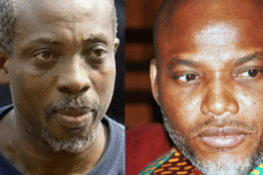“Zombie no go think unless you tell am to think.” – Fela Anikulapo-Kuti, in the song, Zombie
In 1976, when Fela Anikulapo-Kuti released a song titled “Zombie’ as a metaphor to criticise the Nigerian military government, the nation came to grasp with the master-servant relationship under military regimes and the danger of applying military-style orders in a civilian setting. The song’s central argument was that a civilised society cannot be managed through brute force and intimidation in order to cover up for corruption. The song ridiculed the military government but lit the nation up.
The song was very political in its tone, assertive in its style and mockful in its presentation. It portrayed the Nigeria military regime of General Olusegun Obasanjo as robotic and devoid of intelligent decision-making. Fela’s music was the most scathing assault on a military regime. It was sensational. We danced to it. Zombie ended up being the most impacting song in Fela’s celebrated career as a musician and his status as the champion of the underclass.
There was a price to pay for the success of the record though. For subjecting the military to public derision, the Nigeria Army attacked Fela, razing his home, the Kalakuta Republic in Lagos, to the ground. While at it, the soldiers inflicted ultimately fatal injuries on his mother, a women’s rights activist, Mrs. Funmilayo Ransome-Kuti. The soldiers who had taken law into their own hands were “unknown.” The rest is history.
Perhaps not. The Nigeria Army have returned the zombie in 2019, undoing years of mental separation from military over-reach when they invaded the premises of a national newspaper, the Daily Trust, in Abuja, Maiduguri and Lagos early in the new year. It is disturbing to realise there are still elements within the military structure carrying the gene of zombies who distanced themselves from the trajectory which Nigerians have been following since 1999, when the dirty garb of military rule was shed.
The Nigeria Army has shown over and over again that it is an institution in dire need of transformation. It is an army stuck in the past, oblivious of the future, bent on the administration of force, fear and harassment on the civil populace to get things done. It uses crude techniques to divert attention from the rot within its structures, isn’t trusted by its own soldiers, has been grounded by corruption and is unable to fight the weakest of real enemies.
Bypassing and ignoring the law and the courts is a dark art that the Nigeria Army has perfected.
Under a democratic setting, the Nigerian soldier has continued to act like Fela’s zombie, intimidating ordinary Nigerians instead of protecting them against aggression. A few times, I have watched videos of soldiers in disorderly behaviour. A memorable video shared on WhatsApp some sometime ago revealed a female soldier authorising the severe and corporal punishment of a young man who had simply complemented her good looks. That incident was illustrative of the abuse to which Nigerians were once, and continue to be, subjected by soldiers still locked in the depraved mindset that they are above the law.
It is deeply upsetting to see the military continue to abuse the population it is institutionally obligated to protect – and run away from those it has a duty to fight. When met with a little amount of force, these soldiers fold up rather quickly. The beating they have received over the last few years in the hands of the ragtag Boko Haram terrorists, who continue to displace towns and villages and maim innocent Nigerians, illustrate the folly of the Army.
It is so tragic to read that, against all the progress Nigeria has made after military rule, armed soldiers would consider it appropriate to ransack the premises of a national newspaper and seize computers and journalists. And that the Army spokesman, Brig Gen Sani Usman, would even find words to defend the deplorable action, saying the “lead story on Sunday … divulged classified military information, thus undermining national security.” Oh, please! National security is articulated by the executive branch.
It is deeply upsetting to see the military continue to abuse the population it is institutionally obligated to protect – and run away from those it has a duty to fight.
In their zombie frame of mind, the Army authorities saw nothing wrong with the outcome that they had just taken the law into their own hands and executed judicial judgment – until the civilian Buhari administration intervened. Apparently embarrassed and concerned about political backlash in an election season, the Presidency called the military to order.
Having got the zombies to think, Garba Shehu, Senior Special Assistant on Media to President Mohamadu Buhari, tweeted happily,” The Federal Government has directed the military to vacate the premises of @daily_trust and the order has been complied with. Issues between the military and the newspaper as they affect the coverage of the war in the Northeast will be resolved through dialogue.”
Dialogue and due process are what the Nigerian Army has not been able to understand for so many decades. Had they been properly programmed, they might have been able to process the information and reacted better, regardless of the gravity of the situation or the temptation to be brash. In a democracy, the Army cannot just start rounding up the civilian population in their annoyance without deferring to the police and the court system, except in a state of emergency.
Media Trust Limited, publishers of the Daily Trust, rightly condemned the shutdown as an unlawful act. The Daily Trust has endured a treatment typically meted to private media houses as a prescription under military rule. In the early 1990s, I worked as a journalist for three major newspapers when Ibrahim Babangida and Sani Abacha were military heads of state.
The Nigeria Army have returned the zombie in 2019, undoing years of mental separation from military over-reach when they invaded the premises of a national newspaper, the Daily Trust, in Abuja, Maiduguri and Lagos early in the new year.
At each of these newspapers – The Guardian, National Concord and The Punch – closure was executed in exactly the same manner as reenacted at the Daily Trust. Even when The Punch took its case to a Federal High Court in 1994 and won, the military simply ignored the court. There was nothing the company’s counsel, Gani Fawehinmi, could do.
Bypassing and ignoring the law and the courts is a dark art that the Nigeria Army has perfected. It is, unacceptable for the military leadership to defend their action against the Daily Trust by claiming that the report published revealed too much and endangered planned military operation.
The rule of law is more important than any military action. Besides, the Army had better keep plans hidden because if their best kept secret was revealed to the media, it can also be disclosed to terrorists. It is not the responsibility of the press to keep military strategies secret. If it is not for public consumption, it should be closely guarded in the garrison.
The siege mentality and obvious arrogance of the military authorities in Nigeria in this case is too reminiscent of military rule to ignore. The Army’s action proves that the Nigerian military is still not a modern institution; like zombies, they acted without reasoning. They failed to understand how their action would be perceived nationally and processed internationally.
The military should not just be a band of armed soldiers. It should be the company of right-thinking, honorable and law-abiding gentlemen.








